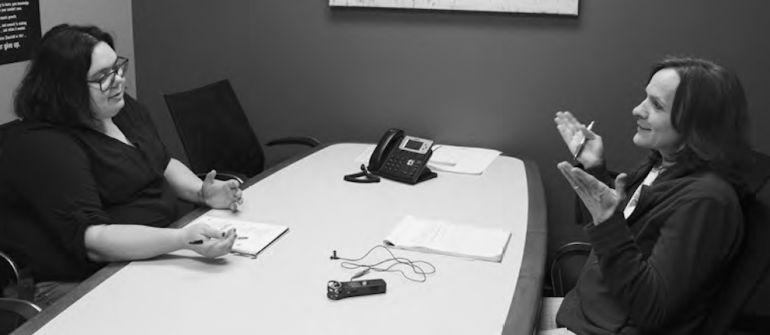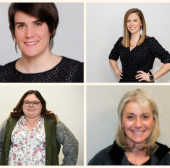By Sierra Wolff, Associate Editor
From the Lessiter Link-Up column of the February 2019 Lessiter Link newsletter
As newcomers to the Lessiter team, Associate Editor Sierra Wolff and Managing Editor Julia Gerlach got together to talk about adapting to their new roles.
Sierra Wolff: Before coming here, what were you previously doing?
Julia Gerlach
- Job Title: Managing Editor
- Years of Experience: 21
- Fact: Took 3-month coding class between last job and LM.
Julia Gerlach: The last job I had, I was there for about 16 years. I started as an administrative assistant in the books department and then got promoted to Associate Editor. I was working as the liaison between the books department and the magazine. I was in that role for 2 years until I transferred to the magazine in 2015.
I late became Editor-in-Chief of that title, and it was really interesting for a long time. Last year, however, I decided I needed a new challenge, wanted to tackle something different, so here I am. And it is really different!
SW: We both got to go to the conferences recently which was pretty exciting — me having never worked on one and you being about a month into working here. What was that like? Had you previously done something similar to that?
JG: We had an annual event that had 10 days of classes, with the final 3 featuring a marketplace. It was structured completely different from NNTC and PFDS because there were no big general sessions. With something like 600-700 classes, it took a huge amount of collaboration.
Sierra Wolff
- Job Title: Associate Editor
- Years of Experience: less than 1
- Fact: Has been involved in equestrian sports in age 10.
As an editorial person, I wasn't really all that involved in any of the logistics of setting it up. I had to be there, and I had meetings with people and various editorial duties. It was very different, but still sort of the same idea in that you've got all these people coming together for this one particular reason, in this one particular place.
SW: Going to our conferences was fun. It was really cool to be part of the behind-the-scenes work. I like that kind of fast-paced, "organized chaos." I love working in that.
JG: You recently graduated with a master's degree. How did that program prepare you for this job?
SW: I taught the "Intro to Journalism, Advertising and Media Studies" course one year and "Intro to Advertising/Public Relations" another year, which gave me a solid base knowledge of media-related fields. As an undergrad, I took some feature writing classes and a course on editing and publishing for magazines.
Graduate classes at UW-Milwaukee consist of meeting once a week for a 3-hr. seminar and require heavy reading. Often there are papers to write on random topics that have nothing to do with your thesis.
JG: It seems like that must have prepared you well for being like, "OK, I have to write about the western bean cutworm (crop pest). I can do that."
“My goal is to find the information that someone, who is already knowledgeable about the topic, will find new and interesting.” — Sierra Wolff
SW: Yeah. With the way grad school was, you just have to adapt. Writing wise, my focus for 2 years was on research ad academic writing. I like the pace and the writing style with this job more than what I did in grad school. At that level it’s like they want you to “stand at the podium” and shout how smart you are. I don’t like writing like that. I don’t think it’s necessary. In my new position at LM, I can enjoy the content that’s in front of me.
Coming here, were you just looking for something completely different? Or did you have some interest in agriculture? Or did you have some interest in agriculture?
JG: I’ve always been a gardener with an interest in growing things. A couple of years ago, I got interested in mycology, the study of fungus and mushrooms, and I read a book called Mycelium Running by Paul Stamets. It talked about the mycorrhizal (symbiotic) associations between plants and fungus and how it really improves the soil biome.
Then I saw the LM job opening, and I was like, “Hmm, that’s really interesting.” I didn’t know anything about big scale agriculture, but I had always been interested in plants and growing things. I was eager to give it a try.
SW: I find it challenging at this stage to figure out what to write about; what the reader is going to find interesting in my writing because there is so much I still need to learn. Where do you start?
“I think with a lot of editorial jobs, this one included, curiosity is big.” — Julia Gerlach
JG: I look up a lot of stuff. I’m constantly on Google, which helps me make sense of it. The editorial work here is completely different than anything I'm used to. Almost everything I did before was how-to based. It was specific; this is how you make this project, from start to finish. Whereas, what we're doing here at Lessiter, there's a lot of different ways to approach a topic.
SW: My goal is to find the information that someone, who is already knowledgeable about the topic, will find new and interesting. It is challenging at times because there are some things I read and initially, I’m thinking, “Huh?” But, yes, the Googling helps.
JG: I think with a lot of editorial jobs, this one included, curiosity is big. Being curious and open to a topic that may be unfamiliar to you is key. I know there are people who would say, “Agriculture? No, not interested.” It’s important to keep an open mind.
SW: Before, I started at LM, I would drive by farms and passively think, “There’s corn in that field” and that was it. Now, I am more aware of the farming process and can recognize farm equipment machinery and brands.
JG: Like most Americans, I hadn’t thought a whole lot about where our food comes from. It’s rewarding to learn about the work that goes into feeding our country and others.


